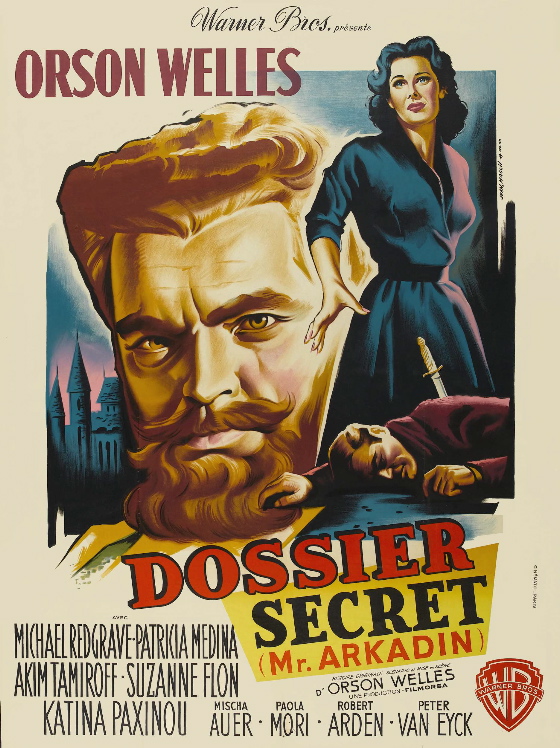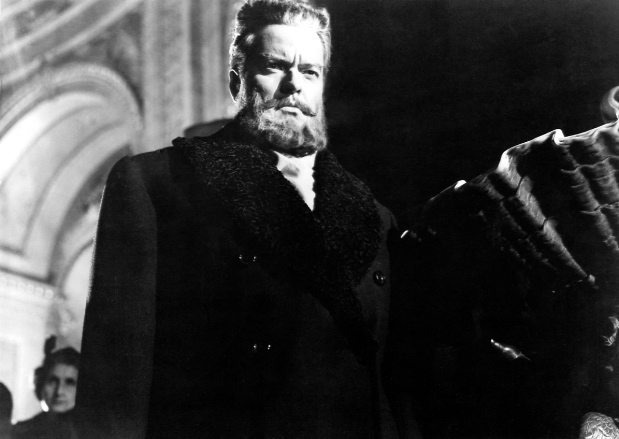
[With plot spoilers . . .]
Mr. Arkadin,
Orson Welles's very strange film from 1955 (also known as Confidential Report), is a kind of parody of an
international suspense thriller — with a cartoonish expressionism of
style that sometimes verges on the Gothic, on the perfectly preposterous. Welles plays
the fabulously wealthy tycoon Gregory Arkadin, a man who is not at all what he seems to be
— and he plays him in a false nose and a bad beard and an even worse
wig that seem to make a joke of the whole proceedings.
Arkadin is ostensibly trying to keep the secret of his scandalous past
from his daughter, but this aspect of the story is barely dramatized
and totally unconvincing. We have no sense that the daughter has
anything invested in the image of her father as a respectable man, no
sense that she (or anybody else) sees him as a respectable man, and we're offered no psychological insight into why his daughter's good opinion of him matters to Arkadin.
But Welles never had much interest in psychology — anymore than
Shakespeare did. For a great dramatist, psychology is always a
reductive science. Why does Hamlet pretend to be mad? To
make himself seem less threatening to Claudius? To amuse himself
with play acting? Os is it because he is mad, and knows he's mad,
and enjoys the black irony of pretending to be what he actually is?
There are no answers to these questions. People have been
psychoanalyzing Hamlet for 400 years precisely because Shakespeare
didn't.

There's no point in psychoanalyzing Arkadin, either — he is a perfect
blank at the center of Welles's film. But, by a wonderful mystery hidden in the storyteller's art, we learn all we need to
know about him at the fringes of the film — including his terrible
“secret”, which, like the character of Arkadin himself, is not at all what it seems to be.
The clue to everything lies back in Warsaw, before 1927 — the year in which
Arkadin claims he was afflicted with amnesia. We eventually learn that the
“amnesia” was self-induced. But what was he trying to forget?
The petty crook Arkadin hires to investigate his supposedly lost past
talks to people who knew Arkadin or his associates in
Warsaw. Although they are recalling a criminal underworld, they
all speak of Warsaw as though it was, in fact, a lost paradise — now
(in 1955) locked behind the Iron Curtain, a place they can never revisit.
Finally, what “Warsaw” really means is revealed by Arkadin's old lover
there, now a faded beauty who speaks of him and of their time together as worth the
betrayal that ended it all. “Warsaw” is simply youth — it's the
loss of this that Arkadin cannot abide. It's what has engendered
his vaguely incestuous obsession with his daughter, it's what leads
him to kill off all his old associates from Poland. Not to hide his
crimes but to wipe away the evidence of passing time, of the lost
paradise — the evidence that he was a
lover once, that he had comrades-in-arms . . . a connection to other human beings.
Welles's performance as Arkadin offers us only one moment when real
emotion seems to grip the character. It's the moment when he
looks into the decayed face of his last surviving friend
from Warsaw — and laughs, with an imperfectly disguised fury that is
genuinely chilling. When asked what it is he finds so funny,
Arkadin replies, “Old age.”
The story of Mr. Arkadin had its origins in a script Welles wrote for an English radio series he starred in, The Lives of Harry Lime.
There the name of the man of mystery is Mr. Arkadian, with its clear
reference to Arcadia, the mythological paradise which is also used as a
synonym for death, as in the Latin phrase Et in Arcadia ego . . . “even
now I am in death.”
In the film, Arkadin recounts a dream he has of walking through a
cemetery whose tombstones all record very brief lifespans. He
learns that they in fact record the spans of friendships — these being
the true measures of a life. This is the graveyard Arkadin now
inhabits — literally killing off his old friends is just his expression of
rage that they are dead to him already, and thus that he is dead.
The Latin phrase quoted above found its way into the Anglican Book Of Common Prayer,
in the burial service — “In the midst of life we are in death.”
That might serve as Arkadin's motto — one he cannot accept.
In the end, scared of losing his last friend, his daughter, he kills
himself. Because of the oblique way Welles has chosen to tell his
tale, we feel no great emotion at this. But our minds keep
drifting back to the monologue about the old days delivered by
Arkadin's aging lover from Warsaw — one of the most memorable scenes in cinema history. This is the narrow aperture
though which we get a glimpse of the real Mr. Arkadin, fleeting,
devastating, heartbreaking. Like Kane, he is, very simply, a lost
soul, bewildered and ultimately destroyed by his aloneness.
To have told us this in so many words would have been to trivialize the
insight. By making us tease it out for ourselves, feel it as a
haunting melancholy at the edge of consciousness, Welles takes us
inside Arkadin in a way Dr. Freud could never have managed.
